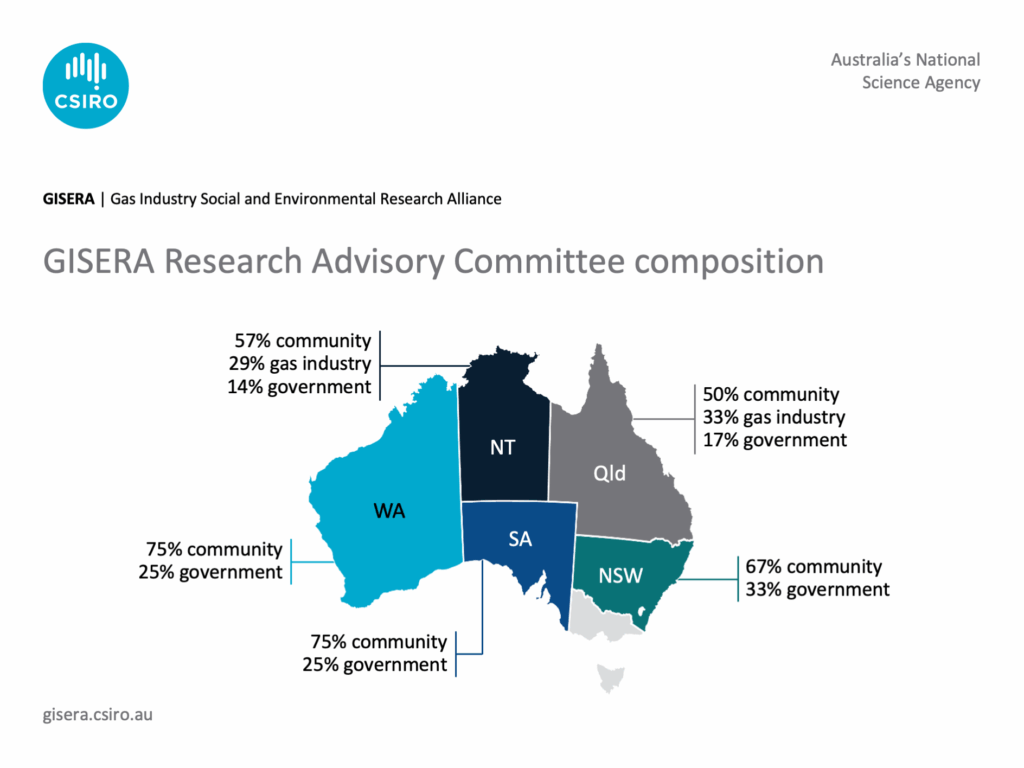Governance

CSIRO’s research status and experience in social, economic and ecological sciences allows it to provide impartial, integrated research to industry, regulators and the wider Australian community. This research has long supported communities, governments and industries with interests in managing agriculture, biodiversity, water and improved resource management.
GISERA’s current industry members are Australia Pacific LNG, QGC, Santos and Origin Energy. The majority of CSIRO’s funding for GISERA comes from government – the Australian Government and the Governments of New South Wales, Queensland, South Australia and the Northern Territory.
Governance structure
GISERA has established processes that ensure CSIRO independence on all research conducted under the Alliance Agreement.
A Deed of Accession was fully executed on 7 March 2024, under which Empire Energy Group Limited and Tamboran B2 Pty Ltd were admitted as parties to the existing Alliance Agreement.
A Variation Agreement to Alliance Agreement was fully executed on 30 June 2025 to extend the Alliance term end date from 30 June 2025 to 31 December 2026.
Research Advisory Committees
State and territory Research Advisory Committees (RACs) review and approve all GISERA research projects that address community concerns, issues and potential impacts of onshore gas development. The RACs also advise the GISERA Director on technical issues, science directions and gaps.
There are currently five RACs – Queensland, New South Wales, South Australia, Northern Territory and Western Australia. The majority of RAC members are from local community groups and non-governmental organisations, and the establishment of each RAC is based on the specific needs of each state and territory. All decisions and discussions at RAC meetings are recorded in the meeting minutes and these are made available for public scrutiny on the GISERA website. The Chair of each RAC has no voting rights.
In addition to the State and Territory RACs, a National Research Advisory Committee will also be established to consider projects of national interest that stretch across states and territories. Section 4.2 of the Alliance Agreement outlines the compositions of the National RAC.

Publication and communication
There are clear safeguards in the Alliance Agreement around CSIRO’s ability to publish independent, peer-reviewed scientific research. Companies do not have rights to alter or edit research reports written by CSIRO under GISERA. When companies sign-up to GISERA, they agree to complete transparency of reporting under these conditions before project proposals have been approved. These are standard protocols CSIRO enters into in all of its major alliance arrangements – they ensure the national science agency’s independence.
We publish all GISERA research, regardless of the findings. All research is made publicly available once it has cleared CSIRO’s established peer-review process. Any risks to public or environmental health and safety identified by GISERA research are reported to relevant authorities.
An Annual Summary Report is prepared annually through each RAC. This document details the following:
- National GISERA budget
- Research investment across Australia for research subject areas
- Research budgets, expenditure and progress by region
- Management and communication budget
- Communication and engagement activities.
Independence and managing conflict of interest
Fundamental to GISERA’s value is the trust that comes from the independent, peer-reviewed and transparent research conducted. The Research selection and approval process document provides an overview of the process used to explore, select and approve research projects undertaken as part of GISERA.
Individuals and institutions engaged as members of GISERA or contributing to GISERA’s projects may be exposed to a range of circumstances under which they will need to identify and manage potential and real conflicts of interest. GISERA will work with individuals and institutions to actively identify, avoid and manage conflicts of interest as part of its normal operating procedures.
If GISERA members or contributors have interests that have, or may be seen to have, the potential to conflict with the individual’s or institutions’ work for GISERA, the individual or institution must disclose that interest to GISERA and take whatever action is required to avoid the conflict. Failure to do so will result in removal from GISERA. Where conflicts of interest are ongoing, it may be necessary for individuals or institutions to relinquish conflicting roles or remove themselves from involvement with GISERA.
